Are you worried your loved one isn’t sleeping well? Do you notice them tossing and turning, napping in the afternoon, or complaining about fatigue most days? Sleep issues in seniors are unfortunately common—but they are not inevitable. With the right understanding, compassionate support, and practical adjustments, older adults can enjoy restorative, quality sleep, and reclaim their days with renewed energy and wellbeing.
In this comprehensive guide from Amy’s Eden Senior Care, we’ll walk you through the most common sleep difficulties for seniors, their causes, how to distinguish normal age-related changes from treatable sleep disorders, and share evidence-based tips and home remedies that genuinely help. Whether you’re a senior, family member, or caregiver, this article is for you.
Table of Contents
- Why Sleep Matters for Seniors: The Foundation of Health and Wellbeing
- Understanding Common Senior Sleep Issues
- Causes and Risk Factors for Sleep Problems in Older Adults
- Addressing Senior Sleep Issues: Habits, Environment, and Routines
- Treatment Options and Senior Sleep Remedies: Evidence-Based Approaches
- Special Considerations: Common Sleep Disorders in Seniors
- When to Seek Help: Signs You Should Consult a Professional
- Conclusion: Building Your Action Plan for Better Sleep
1. Why Sleep Matters for Seniors: The Foundation of Health and Wellbeing
Sleep is not a luxury. It is a core health need, right up there with nutrition and movement. For older adults, restful, uninterrupted sleep is linked to:
- Sharper memory and better focus
- More stable moods and lower risk of depression
- Improved immune function and lower rates of infectious illness
- Reduced risk of falls and accidents
- Better heart health and lower blood pressure
- Greater independence in daily living
Unfortunately, surveys show that over 40% of people over 65 say they have one or more sleep issues most nights. But poor sleep isn’t just “part of getting older”—it’s often fixable!
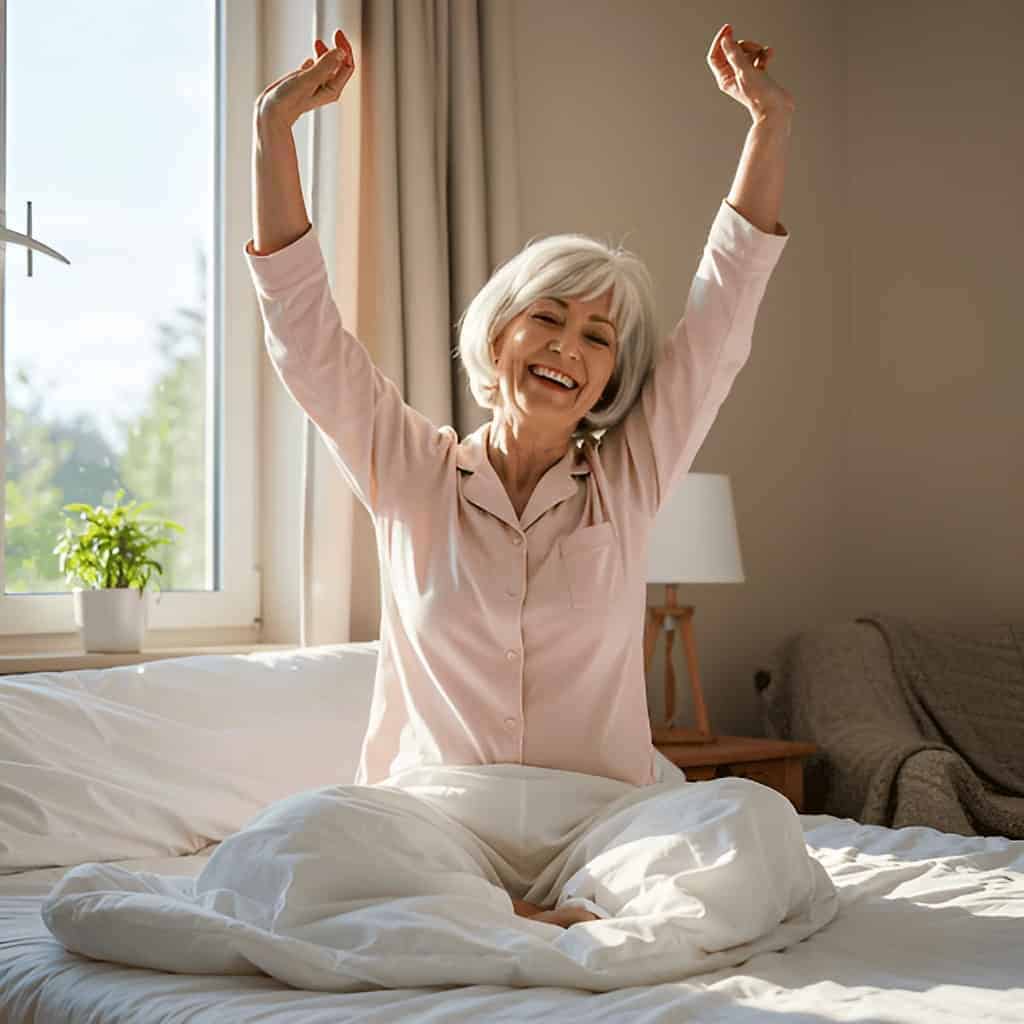
2. Understanding Common Senior Sleep Issues
What do we mean by “sleep issues”? Not all sleep complaints mean the same thing, and distinguishing normal changes from problems is helpful when you want to take action.
Common Sleep Problems Experienced by Seniors
- Insomnia: Trouble falling asleep, staying asleep, or waking too early and not feeling refreshed
- Frequent nighttime awakenings: Waking up often through the night, sometimes to use the bathroom
- Daytime sleepiness: Nodding off easily during the day, needing frequent naps, struggling to stay alert
- Restlessness or periodic limb movements (“restless legs”): Creeping, uncomfortable sensations in legs at night that only improve with movement
- Sleep apnea: Pauses in breathing during sleep, often accompanied by very loud snoring
- REM behavior disorder: Acting out dreams, talking or moving during vivid dreams (commonly associated with Parkinson’s and other cognitive diseases)
Some of these issues are annoying, but others can be warning signs of an underlying sleep disorder or even a medical condition needing urgent attention.
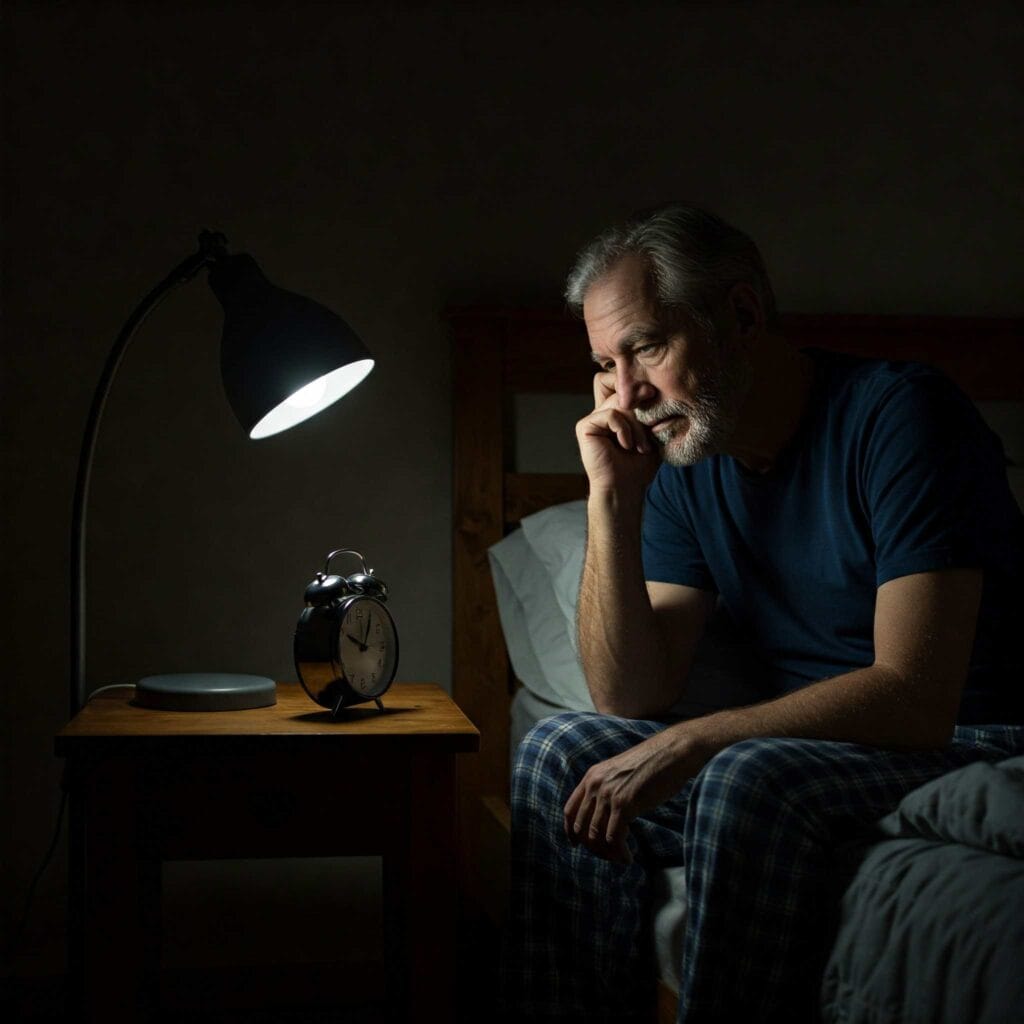
Normal Aging vs. Sleep Disorders
It’s normal for older people to:
- Need less sleep (7-8 hours, compared to 8-9 hours for young adults)
- Wake up more frequently at night (lighter, more fragmented sleep)
- Go to bed earlier and rise earlier
It’s not normal to:
- Experience regular insomnia or severe trouble falling asleep most nights
- Feel persistently tired, moody, or unable to focus during the day
- Need to nap for hours during the day because you can’t stay awake
- Snore loudly, stop breathing, or gasp and choke at night (signs of sleep apnea)
- Experience confusion, agitation, or delirium at night (sometimes called “sundowning” in dementia care)
The Impact of Senior Sleep Issues on Health and Daily Life
Chronic sleep problems can worsen heart disease, impair glucose control, lead to more falls, and increase the risk of depression and cognitive decline. Poor sleep also strains family relationships and increases caregiver fatigue. That’s why addressing senior sleep challenges is a vital part of healthy aging!
3. Causes and Risk Factors for Sleep Problems in Older Adults
Many factors contribute to sleep difficulties in older adults. Understanding what causes them is the first step to improvement.
Common Contributors to Senior Sleep Disturbances
- Natural Changes in Sleep Architecture:
- Less deep sleep (slow wave)
- More light sleep (easy to wake up)
- Earlier sleep and wake times
- Medical Conditions:
- Arthritis, back pain, neuropathy (pain makes it hard to get comfortable)
- Urinary frequency, enlarged prostate, or overactive bladder
- Lung/heart issues—COPD, asthma, CHF
- GERD (acid reflux)
- Parkinson’s, Alzheimer’s, other dementias
- Depression, anxiety, grief, or emotional distress
- Medications:
- Beta blockers, steroids, diuretics, stimulants, allergy meds, pain meds, antidepressants and more can all contribute to sleep difficulties.
- Lifestyle & Environmental Factors:
- Irregular sleep/wake times
- Too much time in bed or napping in the day (“sleeping in shifts”)
- Lack of social activity, sunlight, or movement during the day
- Poor diet, alcohol, caffeine, heavy meals late at night
- Noise, uncomfortable temperature, lack of routine
- Sleep Disorders:
- Insomnia, sleep apnea, restless legs syndrome, REM behavior disorder, circadian rhythm disorders
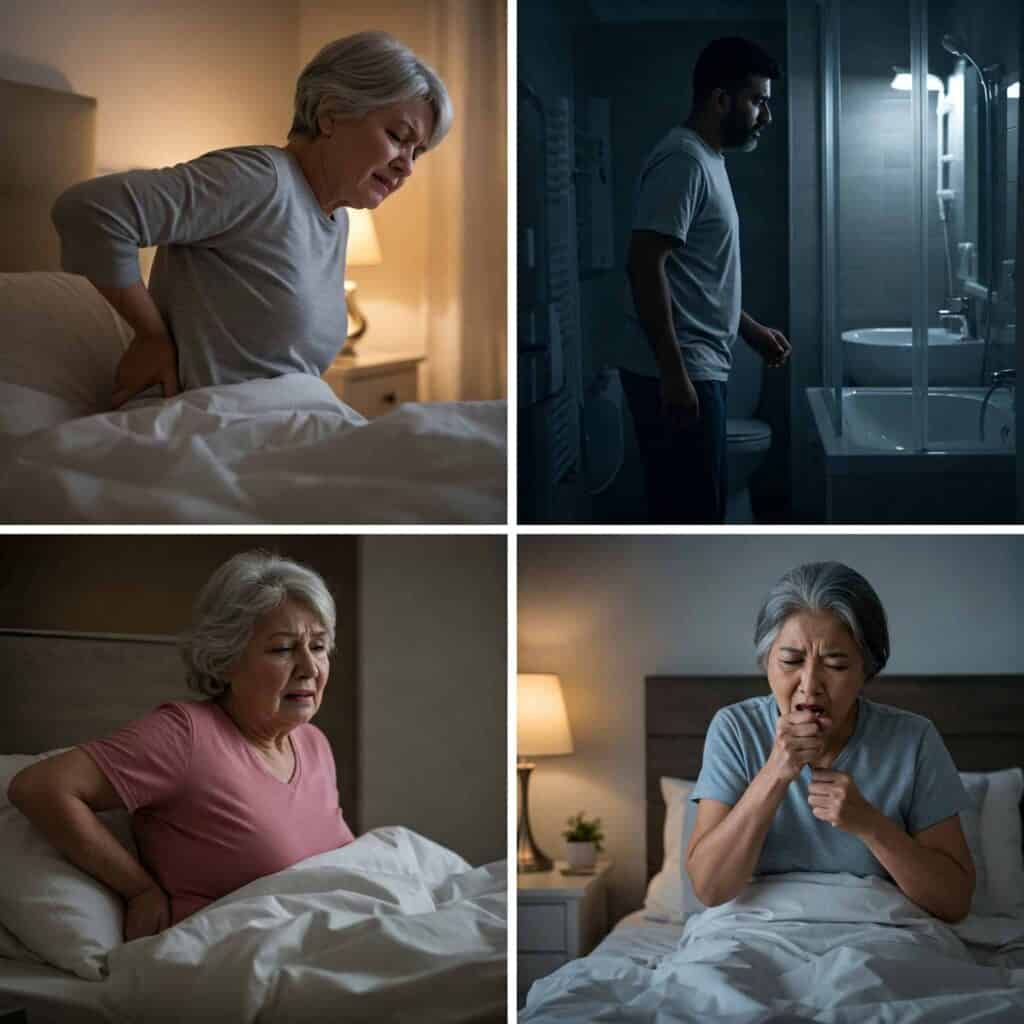
4. Addressing Senior Sleep Issues: Habits, Environment, and Routines That Work
No matter the cause, nearly every senior can improve sleep by making some practical changes. At Amy’s Eden, we’ve found a caring, home-like environment plus wellness-focused routines make a big difference—which you can replicate at home, too! Here’s how:
Maintain a Consistent Sleep Schedule
- Go to bed and wake up at the same time every day—even weekends
- Avoid naps late in the day (after 3pm)
- Limit naps to no more than 30-45 minutes
Optimize Your Sleep Environment
- Keep the bedroom quiet, dark, and cool. Light-blocking curtains or a sleep mask help.
- Use comfortable, supportive bedding and pillows
- Consider a white noise machine if the neighborhood gets noisy at night
- Remove TVs, computers, and phones—blue light interferes with melatonin production
- Ensure the bed is safe and easy to get in/out of, and there’s a clear path to the bathroom
- Safety: Use nightlights and non-slip rugs to reduce the risk of falls during nighttime waking
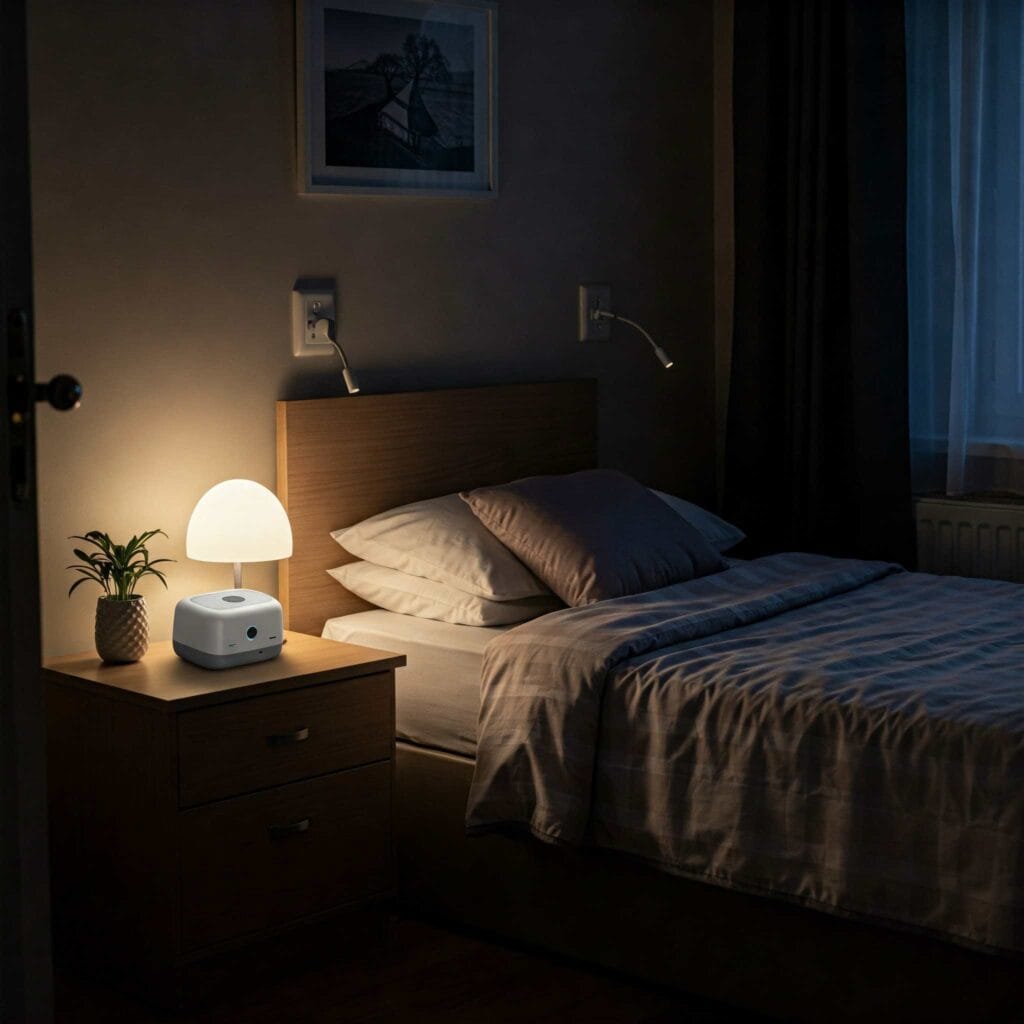
Build Healthy Evening Habits
- Establish a gentle, relaxing pre-bedtime routine (warm bath, quiet music, reading, light stretching, or prayer/meditation)
- Avoid caffeine (coffee, tea, cola, chocolate) after noon
- Have dinner at least 2-3 hours before bed
- Limit alcohol—it interferes with REM sleep and can make waking up more frequent
- Turn off screens 1-2 hours before bed
Get Sunlight and Exercise During the Day
Sunlight helps reset the body’s clock and promotes natural nighttime sleepiness. Aim for 20-30 minutes of sunlight and at least 30 minutes of movement (walking, gardening, chair yoga, etc.) daily.
Use the Bed Only for Sleep and Intimacy
If you’re not asleep in 30 minutes, get up, do something calm in a dim room, then return to bed when sleepy.
Support Emotional Wellbeing
Grief, loneliness, and isolation often worsen sleep. A supportive social environment, companionship, spiritual practices, or talking with a counselor can make a major difference. Amy’s Eden homes emphasize relationships and community, which can be just as important as a good mattress!
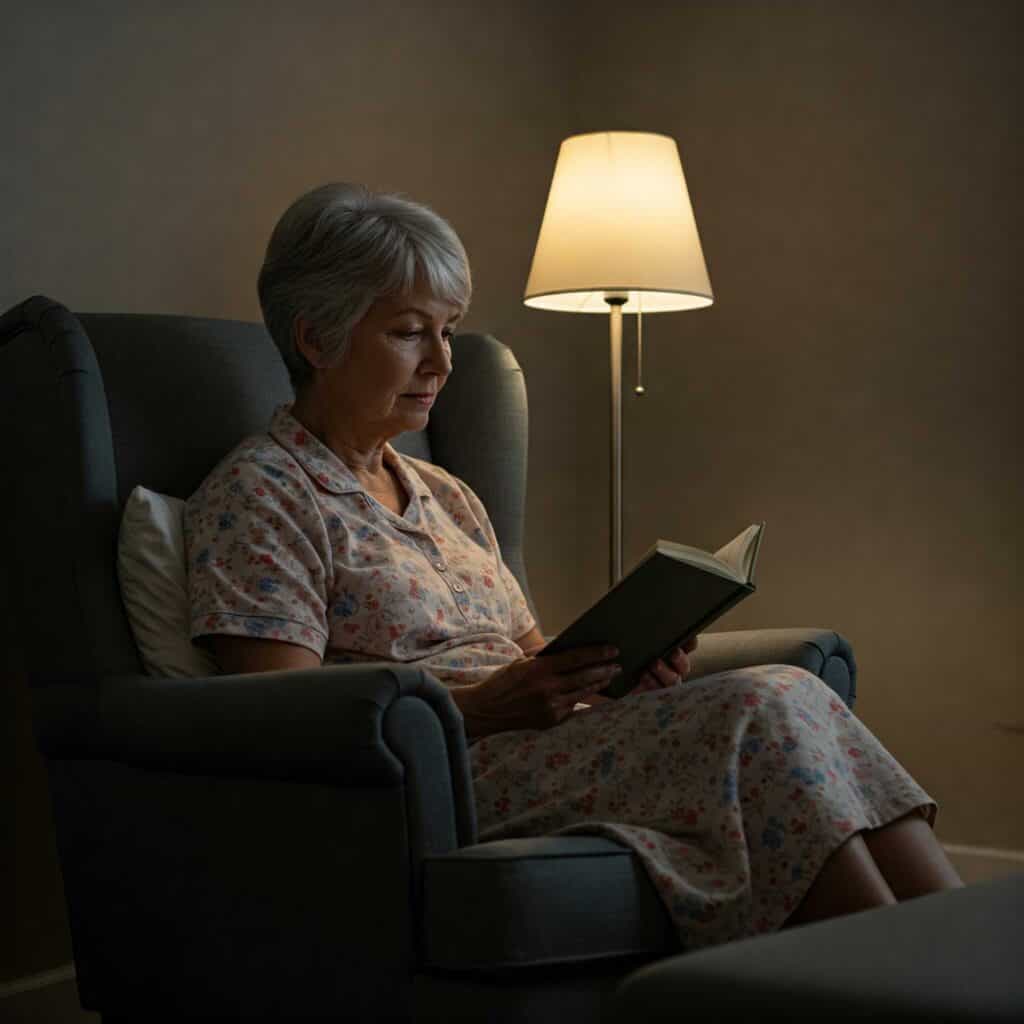
5. Treatment Options and Senior Sleep Remedies: Evidence-Based Approaches
Cognitive Behavioral Therapy for Insomnia (CBT-I)
This is now considered the “gold standard” for chronic insomnia. Delivered by a trained therapist, CBT-I teaches people to:
- Challenge negative beliefs about sleep
- Change self-defeating habits (such as “clock watching” or lying in bed worrying)
- Establish consistent, healthy routines
- Gradually re-learn to associate bed with restful sleep
Ask your healthcare provider for a referral, or use evidence-based online programs if in-person options aren’t available locally.
Relaxation and Mindfulness Techniques
- Deep breathing exercises (try 4-7-8 breathing or box breathing)
- Guided imagery—imagine a calm, happy place
- Progressive muscle relaxation—tense and release muscles from toes to head
- Meditation/centering prayer—great for racing minds
Sleep Hygiene for Seniors
“Sleep hygiene” means all the routine habits, environmental choices, and small decisions that support healthy sleep patterns. For more on this, see our detailed guide to sleep hygiene for older adults.
Nutrition and Dietary Remedies
- Light snack before bed can help—try warm milk, a banana, or a slice of turkey
- Stay hydrated during the day, but reduce fluids 2 hours before bed to help avoid nighttime urination
- Avoid large, heavy, or spicy meals late at night
Over-the-Counter and Prescription Medications
- Use with caution—long term use of “sleeping pills” (even melatonin) can cause side effects and dependency, especially in seniors
- Naturally derived sleep supplements (like melatonin or valerian) may help some people, but should always be discussed with your physician, as they can interact with medications
- If prescription sleep aids are necessary, use the lowest effective dose for the shortest time, and review periodically with your provider

Non-Pharmacological Remedies (Home-Based Help)
- Gentle massage before bed
- Warm bath with Epsom salts (if medical provider approves)
- Aromatherapy using calming scents like lavender or chamomile
- A weighted blanket for those who like the sensation (ensure not too heavy for mobility-impaired individuals)
- Listening to quiet, calming music or white/pink noise
6. Special Considerations: Common Sleep Disorders in Seniors
Insomnia in Seniors
Chronic insomnia (difficulty falling or staying asleep for 3+ months) affects up to 50% of older adults. Often, simple lifestyle changes are enough, but sometimes behavioral therapy or medication is required. Chronic insomnia has been linked with depression, increased pain, and poorer cognition, making intervention very important.
Sleep Apnea in the Elderly
Obstructive sleep apnea (OSA) occurs when muscles in the throat relax too much, blocking airways and causing breathing to stop temporarily. OSA can be life-threatening if left untreated. Signs include loud snoring, choking/gasping during sleep, and extreme daytime drowsiness. Treatment often involves CPAP (continuous positive airway pressure) or oral appliances. Untreated OSA raises stroke, heart disease, and diabetes risk.
Restless Legs Syndrome (RLS) and Periodic Limb Movements
RLS presents as creeping, crawling, or tingling leg feelings, especially at night, relieved only by moving the legs. Sometimes it is linked to iron deficiency or medications. Simple measures (stretching, avoiding caffeine, and sometimes medications) may help.
Advanced Sleep Phase Syndrome
Some seniors develop a shifted circadian rhythm, feeling sleepy very early (6-8pm) and waking extremely early (2-4am). Exposure to bright light in the early evening and minimizing light from screens can often help reschedule the sleep cycle.
Tips for Specific Health Conditions
- Dementia: Maintain strong routines, offer lots of daytime light and activity, and limit evening stimulation. “Sundowning” agitation can sometimes be improved with these measures.
- Chronic Pain/Arthritis: Use supportive pillows and mattress toppers; try gentle stretching or heat packs before bed with a provider’s approval.
- Bladder Issues: Limit fluids before bed; see a urologist for treatment if nocturia (nighttime urination) is frequent.
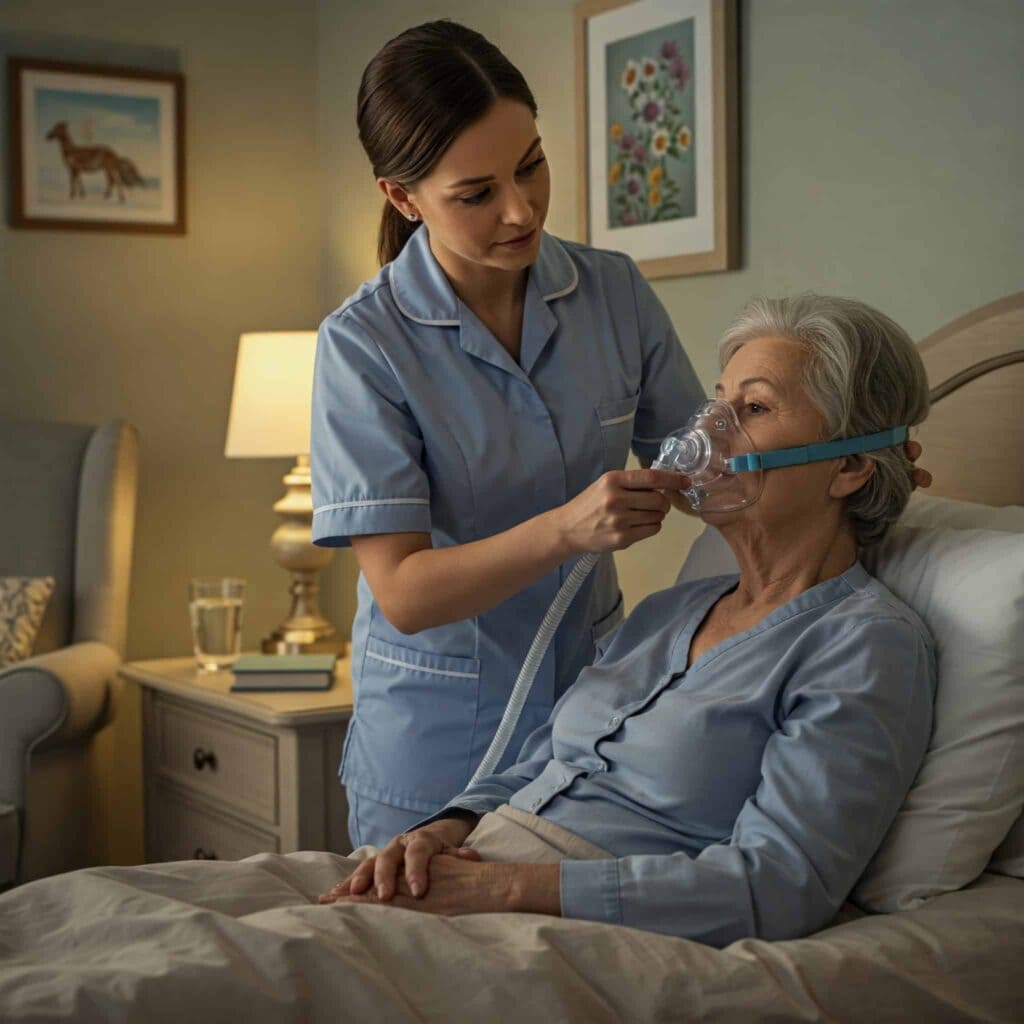
7. When to Seek Help: Signs You Should Consult a Professional
You should consult with a healthcare provider if you or your loved one:
- Has sleep problems that last more than three weeks, without a clear, resolvable cause
- Experiences excessive daytime drowsiness—not just the need for one nap, but dozing off while talking, eating, or watching TV
- Exhibits confusion, agitation, or personality changes, especially in the evening or at night
- Snores loudly, seems to stop breathing, or gasps for air at night (possible sleep apnea—seek prompt evaluation!)
- Experiences vivid, frightening dreams or “acts out” sleep behaviors (potential REM disorder, especially if risk for Parkinson’s), or sudden leg or arm movements during sleep
- Feels consistently sad, hopeless, or anxious—mood and sleep are closely linked
- Has tried home remedies and still isn’t sleeping well or feeling rested

How Amy’s Eden Can Help
Our caregivers are trained to spot the signs of serious sleep disorders, adapt routines for better sleep hygiene, and work closely with your health providers. Whether you’re seeking overnight care, a more supportive long-term setting, or personalized in-home assistance, our unique two-resident homes offer tailored comfort and dignity—making restful nights much more likely.
8. Conclusion: Building Your Action Plan for Better Sleep
Sleep issues are common in older adults, but they are rarely insurmountable. With understanding, the right environment, proven routines, and medical support where needed, seniors can experience genuinely restful nights and energetic, fulfilling days.
- Assess and address common causes—medical, medication, and lifestyle
- Commit to a sleep-supportive schedule and environment
- Practice gentle evening routines and seek emotional support
- Consult your healthcare provider if sleep does not improve within a few weeks, or if you notice any warning signs
At Amy’s Eden, we believe every senior deserves safe, comfortable, restorative sleep in the environment that fits them best. Contact us if you’d like to learn more about how our care homes and caregivers help seniors—day or night—live their best lives.
Ready to make a change? Hope this guide was helpful to learn how you can make your loved one sleep—and live—better, every day.




